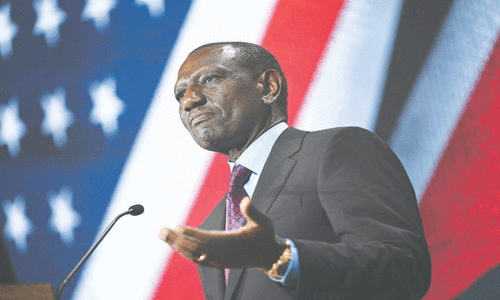KUWAIT, May 21: Kuwait’s Amir dissolved parliament on Sunday a week after lawmakers and the government clashed over an election reform law and called for parliamentary elections next month.
A decree by Sheikh Sabah al-Ahmad al-Sabah ordered the dissolution of the house a few days after reformist MPs submitted a request to question Prime Minister Sheikh Nasser al-Mohammad al-Sabah over the disputed draft law aimed at curbing voting irregularities.
The June 29 elections bring forward a poll set for July 2007, said the decree carried by state news agency KUNA.
The motion to question the prime minister, the first of its kind in Kuwait’s history, deepened a political crisis gripping the OPEC oil producer and US ally.
Analysts say that by dissolving parliament, the Amir aims to end the political crisis that has paralysed the country after the government and parliament reached a dead-end over the extent of the state-sponsored reforms. They say the amir hopes the early vote would bring a “more cooperative” parliament.
“It was imperative for me to take a difficult decision I did not wish to take. But I saw it as my duty to dissolve parliament constitutionally to safeguard our homeland’s security and the safety of its sons,” the Amir said in a televised speech.
“The incitement (of the crisis) kept us from our priorities and ... the practices of some people deviated from the correct parliamentary demeanour. This posed a threat to the security of the homeland and its stability,” he said.
“There are limits that all should respect.”
Kuwait is the first Persian Gulf Arab state with an elected parliament with clout. The assembly, where Islamist and conservative MPs have big influence, often clashes with the government and holds ministers to task.
The Amir dissolved the house a few months after succeeding his late brother Sheikh Jaber al-Ahmad al-Sabah in January. Before he became amir, Sheikh Sabah was Kuwait’s strongman for years due to the illness of the late ruler and his deputy.
Sheikh Jaber dissolved parliament in 1999 after three years of tensions with the assembly.
The political crisis started last week after the state-sponsored electoral districts draft law that cuts constituencies to 10 from 25 was referred to the constitutional court.
The move further angered several reformist MPs who want the constituencies to be reduced to five, saying sending the draft to the high court would only delay the reforms as the court’s ruling may take months, even years. Many lawmakers boycotted the parliament session in protest.
More recently, some 29 pro-reform MPs have vowed to boycott a special parliament session on Monday that the government has asked for to discuss the latest developments in the draft law.
The move indicated they planned to press on with the prime minister’s grilling. Sheikh Nasser had two weeks from the date of the filing of the motion on Wednesday to face questioning, unless he asks for a one-off delay of two more weeks.
Allegations of vote buying have marred previous polls in Kuwait.—Reuters














































Dear visitor, the comments section is undergoing an overhaul and will return soon.